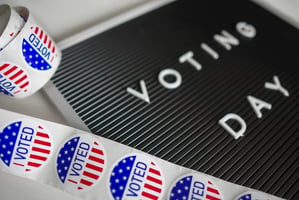Most of us have heard about Homeowners Associations (HOAs) — a group of people responsible for...
Everything You Need to Know About the HOA Elections and Online Voting
This detailed guide explains and answers all your questions on HOA and condo election rules, process, requirements, board term limits and tips to hold a successful and fair election.
HOA elections are held to elect the board members in charge to operate the HOA and control its actions, activities, and decisions.
These activities include setting community bylaws, enforcing rules, taking care of maintenance, handling association finances, and acting in the association’s best interests.
HOA board members can hold a lot of power and need to be chosen carefully. This is why homeowners need to be informed of and involved in the electoral process.
This guide will tell you everything you need to know about voting in HOA elections.
Community Associations and Voting Rules
Community associations are run according to their governing documents. These include the Articles of Incorporation or Association, CC&Rs (covenants, conditions, and restrictions), rules, regulations, and bylaws.
Voting rules are usually laid out in the bylaws but may also be found in the CC&Rs. These documents will walk you through the voting rights, rules, and procedures.
The governing documents can often be found on the community association website. Homeowners can also get copies from public records, title companies, their realtors, board members, or the management company.
Community associations are obligated to provide owners with a copy of the governing documents.
The HOA Election and Voting Process
Regular HOA elections happen at the annual general meeting. Here is how it works:
- The HOA sends homeowners preliminary notification of upcoming elections that includes which positions are open and instructions on how to become candidates.
- The HOA creates an electoral roll of eligible candidates.
- The HOA adds the vote to the meeting agenda.
- The HOA notifies the homeowners of the upcoming annual general meeting and election.
Notice Requirements
HOAs have to give owners proper notification of an upcoming election. Notification can be given by mail or email and should include comprehensive information on the meeting’s date, time, place, and purpose.
HOAs can also place signs in the building’s public areas.
Annual general meetings are usually announced 14 to 30 days in advance. Special general meetings may be announced 5 to 10 days in advance.
Who Can Vote
Usually, board elections can take place at the annual general meeting, special general meetings, and make-up meetings.
Homeowners are granted one vote per housing unit or a separate interest that they own. If one person owns seven units, that person gets seven votes.
The voting homeowner must be on the title. A spouse who lives in the home but isn’t on the title typically isn’t allowed to vote.
Sometimes a unit’s mortgage lender will reserve the right to vote in place of the owner. In these cases, the HOA should treat the mortgage lender as the voter rather than the owner.
Parking spaces and storage lockers aren’t typically considered units for voting purposes.
How to Vote in an HOA Election
HOA election voting can be done in several ways. Votes can be placed in person at the annual general meeting or be done remotely. Voting can also be done in advance.
Here are the options:
- Online Voting: online voting systems can be used for HOA elections
- Written HOA Ballots: homeowners can vote by personally casting ballots at the meeting
- Mail-in HOA Ballots: homeowners can mail in completed HOA ballots
- Secret HOA Ballot: secret ballots can be used when positions are being challenged, the board of directors thinks it’s appropriate, or 20% of homeowners request it
- Proxy Voting: homeowners can give another homeowner the right to vote on their behalf
- Electronic Voting: certain jurisdictions permit electronic voting
- Advanced Electronic Voting: homeowners can have the option of using electronic voting before the meeting
The community association’s bylaws and jurisdiction determine what’s permissible. Proxy voting isn’t always permitted due to the risk of voter fraud.
HOA Quorum Requirements and What Happens Without One
An HOA quorum is the minimum number of association members needed to legally hold a meeting or election. Condos and community associations can’t conduct official meetings without a quorum of owners present. HOA elections that take place without a quorum of owners voting are considered invalid and must be redone.
HOA quorums prevent secrecy and fraud by ensuring that most homeowners are informed of what’s going on in the association. Quorums also prevent a small group of people from controlling the HOA by requiring votes to be made by a significant group of owners.
It would be bad for everyone if one, two, or three homeowners could decide on elections or participate in HOA meetings by themselves. Quorums help to prevent those scenarios.
HOA quorum requirements can be set by the bylaws or the government. Quorums are often defined as a simple majority – which means more than half the voting interest. Florida sets HOA quorums at 30% of the total voting interests unless a lower number is given in the bylaws. BC sets quorum requirements for annual general meetings at 1/3 the voting interests for large strata or 2/3 the voting interest for smaller associations.
Quorums aren’t always reached. When this happens, the meeting has to be adjourned. The board has to schedule a new meeting within a few business days and give sufficient notice.
When HOAs repeatedly fail to reach a quorum, they can petition a court to reduce it. Some jurisdictions permit meetings to be held with a lower number of people if quorums can’t be reached.
Can I Abstain to Vote?
Yes, you can abstain to vote. Members have the option of voting or abstaining. Abstentions are counted towards the quorum as these options still represent a member’s participation in the voting process.
Abstentions aren’t counted as a yes or a no vote and won’t affect the voting result.
Terms Limits for HOA Board Members
HOA term limits restrict how long a board member can serve. That’s important for keeping HOA boards fair, representative, and accessible. It isn’t good to have board members who can serve for lengthy periods. Term limits restrict members from amassing too much power and control over time.
Term limits are set by the province, state, or association’s bylaws. The government-established term limits take precedence if a community association doesn’t set its own term limits.
Term limits set by the government vary. Ontario caps term limits at three years. HOAs in Florida have term limits of two years and prohibit any board member from serving more than four consecutive terms.
HOAs can choose to set their own limits. Many set them at anywhere between two and eight years. There are benefits and drawbacks to having short or long-term limits.
The benefits of shorter-term limits include:
- More opportunities for new members to be elected and serve on the board of directors
- Gets bad and subpar directors out faster
- Keeps cliques from forming
- Prevents directors from gaining too much power over time
The benefits of having longer-term limits include:
- More leadership consistency and continuity·
- Good directors can stay on for longer·
- Less turnover to deal with
HOA terms are usually staggered to prevent board members from leaving at the same time. This helps maintain continuity during director turnovers. It wouldn’t be good to have a significant number of board members leave at once. You always want to have an experienced person on the HOA board.
Fraud and Impropriety in Voting and Example of Disputes
HOA elections are vulnerable to impropriety, fraud, and manipulation. Voting is a long and complicated process with many opportunities for inadvertent impropriety or willful fraud.
Homeowners often make mistakes because they don’t know what to do. The chance of this happening goes up when homeowners are given written HOA ballots to fill out. Most HOA elections will have to discard a few ballots for being completed incorrectly.
HOA elections can be manipulated during preparation or when sending HOA ballots, discarding ballots with supposed errors, or counting them. It’s easy for physical ballots to be forged or tampered with. And proxy voting is highly vulnerable to fraud and impropriety.
There are many ways to manipulate an election. One HOA in Florida ended up with 61 more unit votes than it should have. The state later found 174 duplicate votes. In another case, homeowners found that ballots were fraudulently submitted in their names with forged signatures.
It can be difficult for community associations to run clean and successful HOA elections. The board of directors holds a lot of power. A surprising number of people are willing to rig elections to get the results they want.
Most HOAs will see some cases of election fraud. However, it does happen more frequently in certain areas. HOAs in Florida seem particularly prone to it.
Voting impropriety and suspicions of fraud lead to election disputes. However, there are also times when disputes themselves are attempts at manipulating legitimate results.
HOA election rigging is a crime. Homeowners should contact their local law enforcement if they suspect electoral fraud.
Reasons Why HOA Directors or Officers Can Be Removed
HOA directors and officials have a lot of power and responsibilities. There are times when one has to be removed. HOA directors or officials can be removed for cause, without cause, or by court action.
For cause, removals are the most common. HOA can be removed if they are failing to perform their duties and obligations. They can also be removed if they aren’t behaving professionally.
Reasons to remove an HOA board member include:
- A director isn’t doing their job
- A director breaches their fiduciary duty to the HOA
- A director can’t work well with others
- A director exhibits inappropriate or problematic behaviour
- A director is disruptive or combative
- A director is no longer an owner and resident
An HOA’s Articles of Association, CC&Rs, bylaws, or other governing documents may specify circumstances when directors or officials can be removed.
Court action can be taken to remove a member of the board of directors in cases of fraudulent or dishonest acts or gross abuse of authority. Courts can also bar removed directors from being reelected for certain lengths of time.
Homeowners always have the option of removing a member of the board of directors simply because they want to. A without cause removal doesn’t require legal justification.
How to Remove an HOA Board Member
A community association’s homeowners have the power to remove an HOA board member by voting them out. Homeowners in Florida HOAs can also remove board members by a written recall agreement.
Voting a board member out takes a few steps. Owners have to requisition a meeting to vote on it. However, one owner can’t requisition a meeting alone. A recall meeting can only be requisitioned if enough owners agree to do so and sign the request form.
Minimum requisition percentages vary. Ontario requires that at least 15% of unit owners requisition a meeting to recall a director. HOAs in Florida allow requisitions with at least 10% of the voting interests. California permits requisitions with as few as 5% of the voting interests.
The requisition request must be in writing and include the name of the director, the director’s position, and any reasons for removal. It also includes the owner’s names, signatures, and units owned. It should be given to the community association’s service address, president, or secretary personally or by registered mail.
The board must hold a recall meeting within a certain timeframe and after giving appropriate notice. This meeting will include a vote. HOA board members can only be recalled if the majority agrees to do so. This means a vote of 51% or more.
A written recall agreement can be used to remove board members in Florida HOAs. A homeowner representative must serve the board with a recall petition accompanied by individual recall ballots that are filled out and signed by unit owners.
A written recall agreement must be supported by at least 50% of the voting interest. Homeowners should ideally have a 10 to 15% margin in favor of the recall.
The written recall agreement with all the signed ballots should be sent by registered mail or personally delivered to an HOA board member, an HOA officer, or the HOA’s registered agent.
The board is required to hold a meeting to certify the recall within a few business days. HOAs in Florida must hold a recall certification meeting within five days.
Owners have the most power to remove board members. In most states, provinces, and community associations, homeowners are the only ones that can remove a board member without cause.
Some community associations permit the board of directors to remove members for due cause and with a majority vote. The board may be permitted to impeach and remove another member under certain circumstances if 2/3 of them agree to do so. These powers are restricted and reserved for serious cases.
Some community association bylaws or states have provisions that will automatically remove a board member. Florida HOA board members are automatically removed if they are convicted of a felony, charged with felony theft, charged with embezzlement of HOA funds, or more than 90 days delinquent in paying HOA dues.
Homeowners can also petition the courts to remove a board member. The courts can step in when there are cases of fraud, abuse of authority, director incapacitation, felony crimes, or other serious cases.
Board-appointed HOA officers can usually only be removed from their positions by the board.
Do Renters Have Voting Rights?
No. Community associations don’t allow renters to vote during elections. The homeowner on the title is the only one granted voting rights.
Renters can’t be made proxy voters either since only HOA members can be proxy holders.
These restrictions are set by law. Associations can’t get around it by writing different by-laws.
Run Successful HOA Elections with Propty
HOA elections can be tough to pull off. And instances or allegations of fraud and electoral impropriety make things even more stressful.
That’s why HOAs are turning to alternatives like Propty. Propty is a community association management app that makes it easy to run successful HOA elections. It keeps things streamlined, clean, and transparent.
Are you ready to switch from messy, hard-to-track HOA ballots and manual notifications? Try Propty



